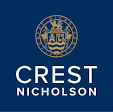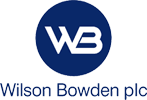Related Research Articles

George Wimpey was a British construction firm that typically worked in the civil engineering and housebuilding markets. It was, during the 1970s, the largest homebuilder active in the UK.

Barratt Redrow plc is the largest residential property development company in the United Kingdom operating across England, Wales and Scotland. It is a constituent of the FTSE 100 Index. It was originally based in Newcastle upon Tyne, England, but is presently located at David Wilson's former offices in Coalville, England.
Bellway p l c is a residential property developer and housebuilder based in Newcastle upon Tyne, England. It is listed on the London Stock Exchange and is a constituent of the FTSE 250 Index.
Persimmon plc is a British housebuilding company, headquartered in York, England. It is listed on the London Stock Exchange and is a constituent of the FTSE 100 Index.

Crest Nicholson is a British housebuilding company based in Weybridge, Surrey. It is listed on the London Stock Exchange and is a constituent of the FTSE 250 Index.
Westbury plc was a British housebuilding company based in Cheltenham, Gloucestershire. It was listed on the London Stock Exchange and was a constituent of the FTSE 250 Index but was acquired by Persimmon plc in 2005.

Taylor Woodrow was one of the largest housebuilding and general construction companies in Britain. It was listed on the London Stock Exchange and was a constituent of the FTSE 100 Index until its merger with rival housebuilder George Wimpey to create Taylor Wimpey on 3 July 2007.

Wilson Bowden plc was a British housebuilding and general construction company headquartered in Coalville in central England.

Trafalgar House was a British conglomerate with interests in property investment, property development, engineering, construction, shipping, hotels, energy and publishing. It was listed on the London Stock Exchange and was a constituent of the FTSE 100 Index. During its later years of operation, it was routinely referred to as being the largest contracting organisation in the UK.
Tarmac Group Limited was a British building materials company headquartered in Wolverhampton, United Kingdom. It produced road surfacing and heavy building materials including aggregates, concrete, cement and lime, as well as operating as a road construction and maintenance subcontractor. The company was formerly listed on the London Stock Exchange and was once a constituent of the FTSE 100 Index.

Taylor Wimpey plc is one of the largest home construction companies in the United Kingdom.
Broseley Estates Limited, also referred to as Broseley Homes, was a housebuilder based in Leigh, Lancashire which operated from the 1950s until the 1980s.
McLean Homes was a major British housebuilding business. It was bought by a major construction company, Tarmac, in 1972 and the brand ceased to be used in 1996.
Miller Homes Limited is a housebuilder based in the United Kingdom.
Beazer was a family business for six generations before expanding in the 1980s into an international housebuilding, construction, and building materials group. After becoming overburdened with debt it was rescued by Hanson plc in 1991. A new Beazer Group, comprising solely the UK housebuilding business, was demerged from Hanson in 1994, and bought by Persimmon plc in 2001.
Comben Homes was a large British house builder.

CALA Group (Holdings) Limited is a British housebuilding company with headquarters in Edinburgh, Scotland, and in Staines-upon-Thames, England.
Jeffrey Fairburn is a British businessman, currently chief executive of Berkeley DeVeer, a Yorkshire-based house-builder.
Charles Church Developments Limited, trading as Charles Church, is a British upmarket housebuilding company which is headquartered in York, England. The company is named after its co-founder Charles JG Church who established the business in 1965. After a series of complex restructurings and takeovers, the company has been a subsidiary of Persimmon plc since 2001.
Untypical is a British housebuilding company.
References
- 1 2 Alan Jackson, Semi-Detached London (1973)
- 1 2 Prospectus (May 1934)
- 1 2 Michael Furnell The Diamond Jubilee of Ideal Homes (1989)
- 1 2 3 4 5 Wellings, Fred: Dictionary of British Housebuilders (2006) Troubador. ISBN 978-0-9552965-0-5
- ↑ The Investors’ Review 25 July 1936
- ↑ Persimmon off document Feb 1995